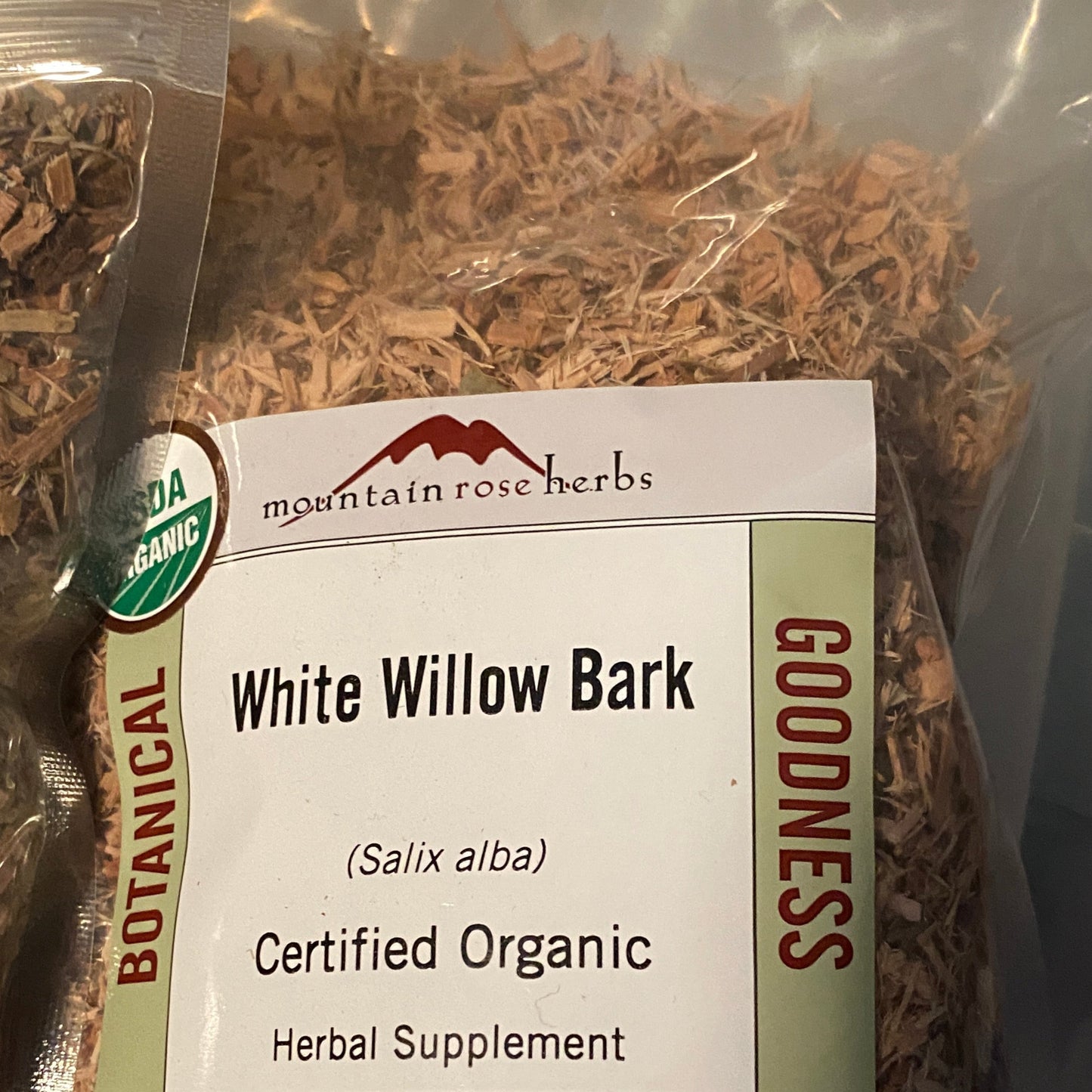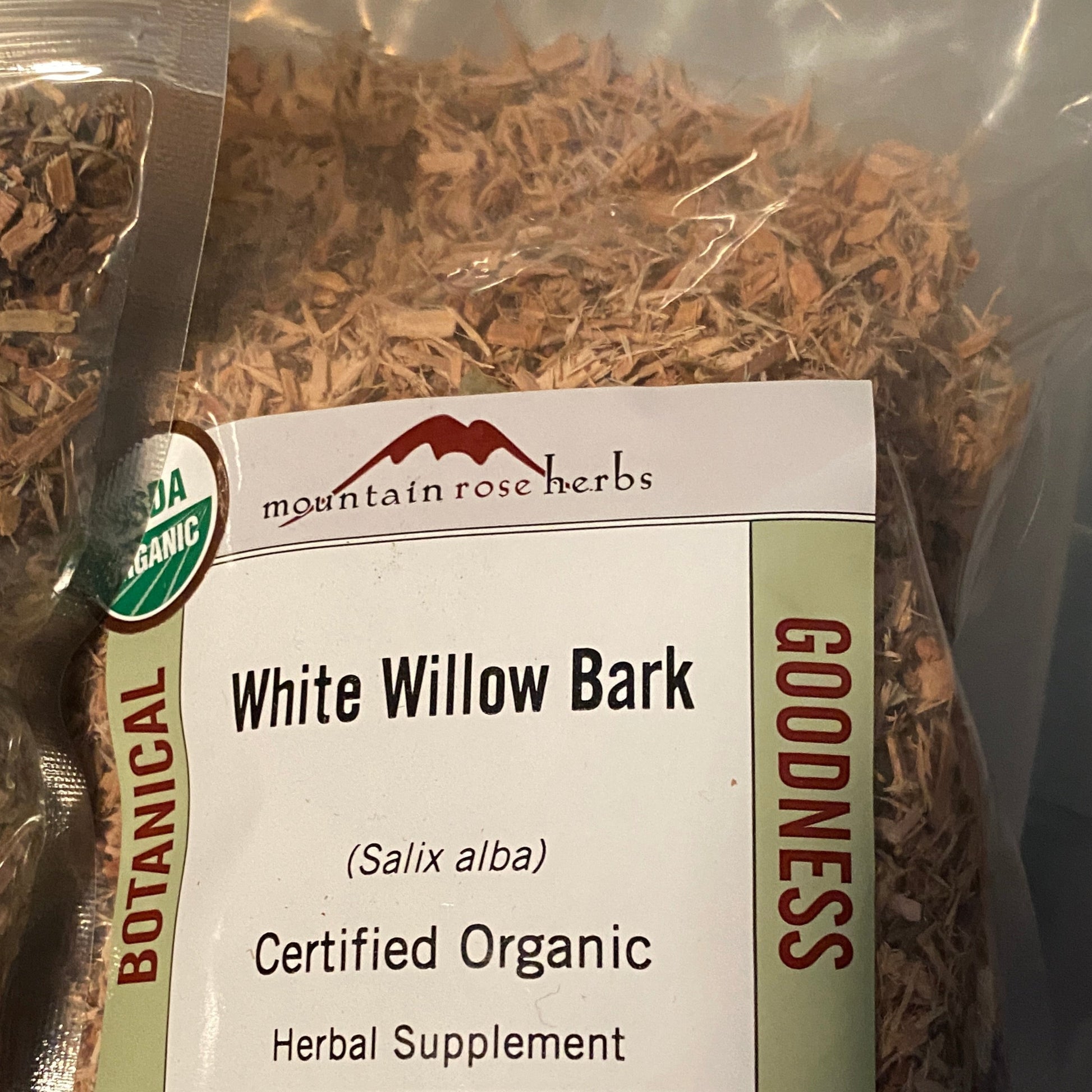1
/
of
1
Adnira
Organic White Willow Bark Glycerite
Organic White Willow Bark Glycerite
No reviews
Regular price
$25.00 USD
Regular price
$35.00 USD
Sale price
$25.00 USD
Shipping calculated at checkout.
Quantity
Couldn't load pickup availability
White Willow Bark (Salix alba)
Has been used for centuries as a natural pain reliever, mainly because it contains compounds similar to aspirin. Here’s a detailed breakdown of its phytochemical and nutrient content:
Phytochemicals:
- Salicin: The most well-known compound in white willow bark, salicin is metabolized into salicylic acid in the body. It has anti-inflammatory, analgesic, and antipyretic (fever-reducing) properties, similar to aspirin.
- Flavonoids:
- Quercetin, Kaempferol, Naringenin, Catechins: These antioxidants protect cells from oxidative stress, have anti-inflammatory effects, and contribute to the overall pain-relieving properties of white willow bark.
- Tannins: Polyphenolic compounds with astringent properties, tannins can help reduce inflammation and tighten tissues. They also contribute to the anti-inflammatory and digestive benefits of the herb.
- Phenolic Glycosides:
- Salicortin, Fragilin, and Populin: These compounds, similar to salicin, have anti-inflammatory and analgesic properties. They help in reducing pain and inflammation in the body.
- Proanthocyanidins: Strong antioxidants that provide protection against free radical damage and support cardiovascular health.
- Coumarins: Compounds with potential blood-thinning effects, which can help improve circulation and reduce inflammation.
- Sterols: Plant sterols that may help reduce inflammation and support joint health.
Nutrients:
- Vitamins:
- Vitamin C: An antioxidant that supports immune function and promotes skin health.
- B-Complex Vitamins: Essential for energy metabolism and nervous system function.
- Minerals:
- Calcium: Supports bone health and nerve function.
- Magnesium: Helps with muscle relaxation, nerve function, and energy production.
- Iron: Important for oxygen transport and energy production.
- Potassium: Regulates fluid balance, nerve signals, and muscle contractions.
- Zinc: Supports immune function and cellular repair.
- Fiber: White willow bark contains fiber, which can aid in digestion and support gut health.
Actions and Uses:
White willow bark is primarily known for its pain-relieving and anti-inflammatory properties, making it a popular natural remedy for:
- Pain Relief: Effective for managing headaches, back pain, muscle soreness, and joint pain, including conditions like arthritis. It acts similarly to aspirin but is often gentler on the stomach.
- Anti-Inflammatory: The compounds in white willow bark help reduce inflammation, making it beneficial for conditions like osteoarthritis, rheumatoid arthritis, and other inflammatory disorders.
- Fever Reduction: White willow bark can be used as a natural alternative to over-the-counter fever reducers, thanks to its antipyretic properties.
- Menstrual Pain: Can help relieve menstrual cramps and discomfort.
- Cardiovascular Support: The flavonoids and antioxidants help improve circulation, reduce oxidative stress, and support heart health.
Here’s how different forms of white willow bark extracts can be used, focusing on alcohol-based tinctures, teas, and capsules:
1. White Willow Bark Alcohol Extract (Tincture)
- Pain Relief: White willow bark tincture is commonly used for managing headaches, muscle pain, and joint pain. It acts similarly to aspirin by reducing pain and inflammation, but it is often gentler on the stomach.
- Anti-Inflammatory: Regular use of white willow bark tincture can help reduce inflammation, making it beneficial for those dealing with conditions like arthritis or chronic joint pain.
- Fever Reduction: The tincture can also help reduce fevers, making it a natural alternative to over-the-counter fever reducers.
- Menstrual Cramp Relief: Taking the tincture can alleviate menstrual cramps by reducing inflammation and muscle tension.
How to Use:
- Internal Use: Add 15-30 drops of white willow bark tincture to water, juice, or tea. Take up to three times a day as needed for pain relief, inflammation reduction, or fever management.
- Topical Use: Although less common, the tincture can be diluted and applied to the skin for localized pain relief.
2. White Willow Bark Tea (Herbal Infusion)
- Pain and Inflammation Relief: Drinking white willow bark tea can help manage pain, including headaches, back pain, and joint pain. The anti-inflammatory properties make it effective for soothing muscle aches.
- Mild Sedative: The tea has a calming effect that can help relax muscles and ease tension, promoting better rest and sleep.
- Digestive Health: The tannins in white willow bark can help tighten tissues and soothe the digestive system, providing relief for mild digestive discomforts.
How to Use:
- Tea: Steep 1-2 teaspoons of dried white willow bark in hot water for 10-15 minutes. Drink 1-2 cups per day, or as needed for pain relief or inflammation. It’s best taken with meals to reduce the chance of stomach upset.
3. White Willow Bark Capsules or Tablets
- Convenient Pain Relief: Capsules offer a convenient way to consume white willow bark, especially for those who need regular pain management. They are effective for chronic conditions like arthritis or regular headaches.
- Anti-Inflammatory Supplement: Capsules can be taken daily to reduce inflammation and manage conditions that involve chronic pain and inflammation.
- Menstrual Pain: White willow bark capsules can be used to alleviate menstrual cramps and discomfort, offering a gentler alternative to traditional painkillers.
How to Use:
- Capsules: Follow the recommended dosage on the product label. Typically, 1-2 capsules can be taken up to three times a day, depending on the severity of symptoms. It’s advisable to take them with food to avoid stomach upset.
General Tips:
- Dilution for Tinctures: Tinctures can be potent, so start with a smaller dose and adjust as needed. Be sure to dilute with water or juice.
- Consultation: Always consult with a healthcare provider, especially if you are taking other medications (such as blood thinners) or have pre-existing health conditions. This is particularly important for those using white willow bark regularly for chronic pain or inflammation.
- Quality: Choose high-quality, organic extracts, teas, and supplements to ensure maximum potency and safety. Be mindful of dosing, as overuse can cause stomach upset or other side effects.
Share


